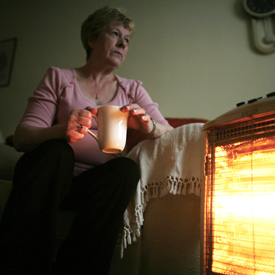Price hikes push a million more homes into fuel poverty
As government figures show a million more households suffering fuel poverty in 2009, consumer groups warn that continued gas and electricity price rises could see this figure soar in coming months.

New figures published by the Department of Energy and Climate Change showed that the number of households suffering from fuel poverty reached 5.5 million in 2009, the latest year for which data is available.
In England, there were four million fuel-poor households, up from 3.3 million in 2008.
The Government said that fuel poverty – judged on spending more than 10 per cent of income on keeping homes warm – jumped in 2009 due to rising gas prices of 14 per cent and electricity of 5 per cent.
Analysts warn that fuel poverty – which has been increasing since 2004 – largely affects vulnerable households with elderly, disabled or long-term sick people with children.
The latest data comes just days after British Gas announced another price hike, citing rises in wholesale gas costs, which will see gas and electricity bills jump by 18 per cent and 16 per cent on average.
Last month, Scottish Power announced a similar hike in bills and the rest of the “big six” suppliers are expected to follow suit in coming weeks.
2011 bills expected to rise
Consumer rights group Consumer Focus has warned that the latest hike in prices could force as many as 6.4 million households into fuel poverty in the coming months.
The average annual dual fuel bill is currently more than £1,132, Consumer Focus told Channel 4 News, but that figure is set to rise to almost £1,200 when British Gas and Scottish Power increases come in during August.
And average bills could leap further still if the other major gas and electricity companies put up their prices as expected.
These new figures show the old policies to help the most vulnerable were not working. Greg Barker MP
Consumer Focus wants energy companies to be more transparent on the costs of wholesale utility prices and to pass reductions, as well as hikes, on to their customers.
“Vulnerable people are spending the biggest proportion of income on energy bills,” Consumer Focus said.
“Energy companies can be very quick to put prices up when wholesale costs rise. But when prices fall, they often don’t reduce prices at the same speed.”
While wholesale prices peaked in 2008, consumers are paying more, the consumer group added.
The Government says the right schemes are being introduced to help combat fuel poverty for vulnerable people, while encouraging people to use less energy.
“These new figures show the old policies to help the most vulnerable were not working,” Climate Change Minister Greg Barker said.
“That’s why, this year, we’ve introduced the Warm Home Discount which will require the Big Six energy companies to provide discounts of at least £120 to about 600,000 of the poorest pensioners.
“We’re also pushing for stronger competition to keep price rises as low as possible.
“In the longer term, we’ll be helping people use less energy with the Green Deal which will provide extra support for the poorest and most vulnerable to benefit from energy efficiency measures.”